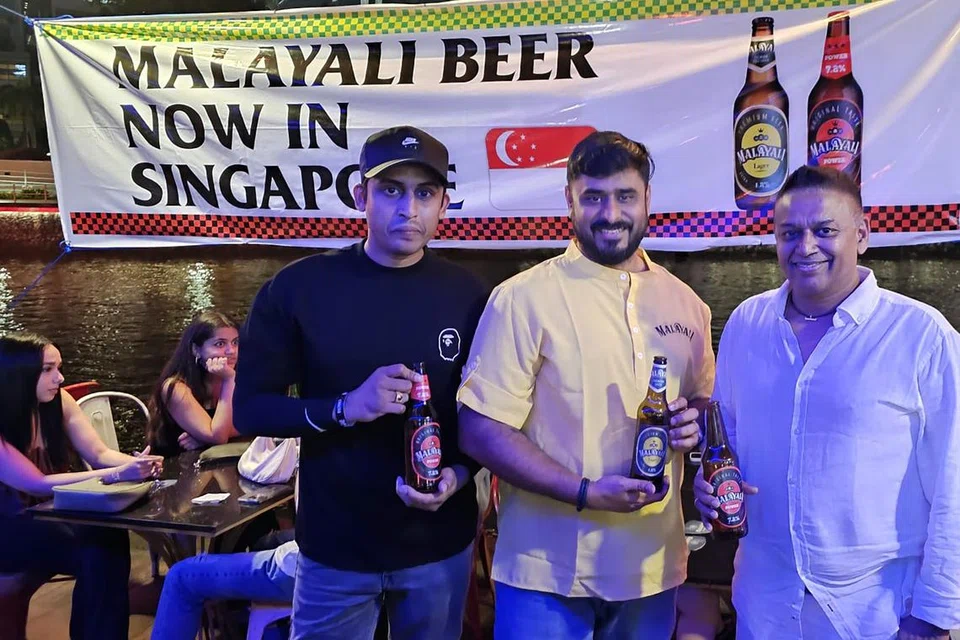When Chandramohan “Chandu” Nallur, a Kerala-born entrepreneur and teetotaller based in Warsaw, Poland, found himself burdened with 20,000kg of parboiled rice flakes in 2022, launching a beer brand was nowhere on his radar.
The rice, intended for the European cereal market, was rendered commercially unviable after the outbreak of the Russia-Ukraine war caused severe currency fluctuations.
With the importer backing out just days before the shipment docked, Mr Chandu was staring at a loss that would have crushed most small businesses.
Desperate to find a solution, he typed an odd query into Google: “What can I do with rice flakes?” The search returned a surprising suggestion – beer. A few meetings with breweries later, Malayali Beer was born.
“I had to figure a way out,” Mr Chandu said at the beer’s Singapore launch on July 19. “Initially, I thought of turning the flakes into animal feed, but that would’ve taken nine months for certification. Sending it back meant complete loss. So, I took a leap of faith – into an industry I never imagined I’d enter.”
The beer is brewed in Poland using a unique blend of European hops and Indian rice flakes. The result is a lager that’s light, smooth, subtly sweet, and surprisingly versatile.
It was an accidental experiment that now has craft beer lovers, restaurateurs, and distributors from across continents taking notice.
Singapore marks Malayali’s entry into Southeast Asia – and its 18th international destination. A soft launch was held at Star Bagawan Bar in Boat Quay, attended by influencers, Indian community leaders and former Malaysian ambassador to Poland, Dato Chitra Devi Ramiah.
“This is a proud moment,” Mr Chandu said. “Singapore is a melting pot. It reflects the very spirit of what we’re trying to do with Malayali Beer – bring cultures together over a drink.”
The journey from parboiled rice flakes to pub shelves began with more than just Google searches.
Mr Chandu, then the head of business relations at the Indo-Polish Chamber of Commerce, teamed up with fellow Malayali Sargheve Sukumaran, a former Samsung designer.
Mr Sargheve took charge of the beer’s visual identity, crafting eye-catching labels that originally featured a cartoonish Mohanlal (from the iconic Malayalam film Spadikam) in Kathakali headgear. Copyright issues with the sunglasses in the design led to a tweak, but the essence remained intact.
The brand launched officially in July 2023. Its first big market? Indian restaurants in Poland, which number nearly 500.
From Warsaw alone – home to 144 Indian eateries – Malayali Beer made its way into 39 of them. Within two months, 50,000 bottles were sold. By the end of the year, another 36,000. By mid-2024, over 155,000 bottles had been consumed.
Initially, Indian customers weren’t impressed. “Malayali Lager at 4.8 per cent alcohol was too light for many Indians,” Mr Chandu admitted. “But surprisingly, Europeans – especially women – loved it. It was easy to drink, paired well with food, and didn’t cause bloating. That’s when we created Malayali Power at 7.2 per cent, and it became a hit with the diaspora.”
The brand now offers three variants: Malayali Lager (4.8 per cent), Malayali Power (7.2 per cent in bottles, 7.5 per cent in cans) and Malayali Habibi, a non-alcoholic malt drink.
Their colour-coded labels – yellow, red, and blue – have cultural resonance. “Red pays tribute to Old Monk rum, yellow and blue to the Ukrainian flag. After all, this beer exists because of that war,” Mr Chandu explained.
Later, Mr Pradeep Kumar Nayar, managing director of Vistula Foods and one of Poland’s largest apple exporters, joined as mentor and investor.
Singapore’s launch was spearheaded by distributor L Pravin Kumar, who runs Star Bagawan Bar. “I came across Malayali Beer last June while recovering from a major accident,” said Pravin, a third-generation Tamil Singaporean. “I reached out on Instagram. After months of licence applications, I became their distributor.”
Despite only launching last month, the beer is already in more than 10 restaurants and climbing. A 500ml bottle sells for $12 to $15 at Star Bagawan and from $8 upwards at restaurants.
“Malayali Lager is a game changer,” Mr Pravin said. “It complements spicy Indian dishes rather than clashing with them. That’s rare.”
Mr Pravin, whose bar has become a hub for Indian students, expats, and foodies, believes the beer’s real power lies in its cross-cultural appeal. “We’re starting with Indian restaurants, but we’re expanding to Western, European, and even Mexican eateries. The beer is brewed in Europe. Why limit its audience?”
His first shipment included over 8,000 bottles. “Next one will be four times that,” he said confidently.
The team is already working on can variants to cater to Singapore’s dormitory mini-marts, which prefer canned over bottled beer. “The design is a matte black can – it feels premium even before you drink it,” he added.
Malayali Beer is more than just a beverage – it’s a cultural homage. The name itself is rooted in Mr Chandu’s experience during Operation Ganga, India’s evacuation of students from war-torn Ukraine. Of the 400 volunteers who helped Indian students at the Poland border, 298 were Malayalis.
“I realised then that being Malayali is an emotion,” he said. “The beer is a tribute to those volunteers – faceless heroes who showed up without expecting recognition.”
Dato Devi Ramiah echoed the sentiment. “I saw Chandu and Pradeep working around the clock during the war. They helped evacuate 25,000 Indian students. Today, I tried their beer for the first time. It’s smooth and, honestly, very good,” she said.
Despite its Indian identity, Malayali Beer’s business model is European. Inspired by Red Bull, which outsources its manufacturing, Malayali rents brewery capacity based on demand. “That way, we control costs, avoid overheads and remain agile,” Mr Chandu said.

